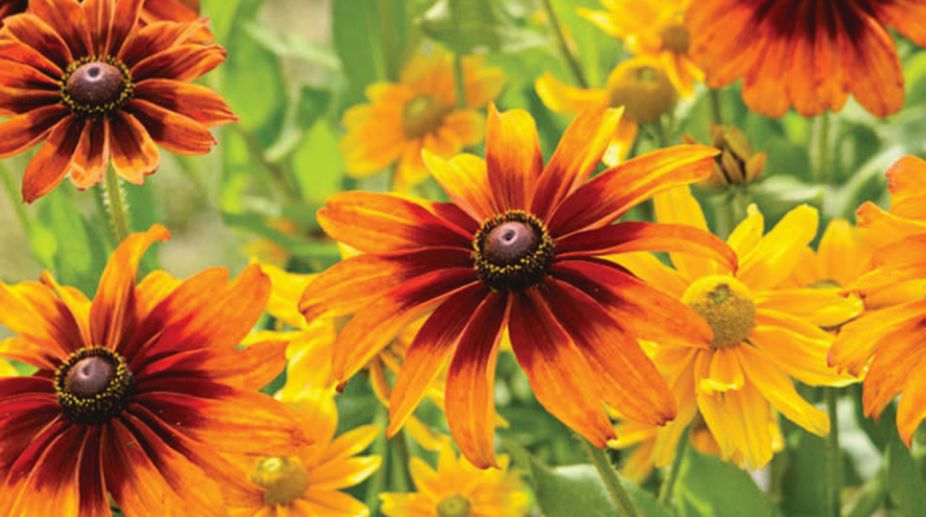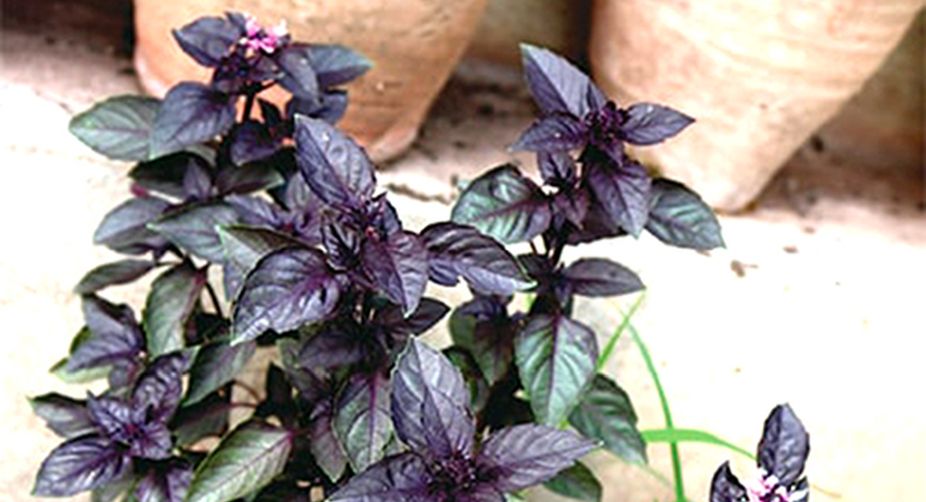Warmer days ahead in Delhi as mercury soars 40 degrees Celsius
The MeT Department has forecast heat wave conditions in parts of the capital from Monday to Wednesday.
Electricity supply/generators and budgets permitting — we can indulge in air-conditioned bliss to rejuvenate exhausted spirits but, out in the garden, the battle to survive gets tougher each year.
Zahrah Nasir | May 13, 2018 3:18 am

Black-eyed Susan (Rudbeckia hirta 'Cappuccino')
Protecting vulnerable plants from extreme heat is important if you want them to survive and thrive. Watering them simply isn’t, in many cases, enough; they need to be shaded from the burning rays of the sun – and from any associated hot, dry winds, too. If vulnerable plants e.g. ferns and other assorted ‘soft-leaved’ plants – roses, tomato vines, petunias, carnations, chrysanthemums, etc, – are in pots/containers then it is simply a matter of moving them to partial or full shade.
But if they are being grown directly in the ground then erecting strategically-placed, strongly secured, shade-netting, or contriving shade out of discarded bamboo blinds, old bedsheets/ old curtains or something else usable that you have lying around, is highly recommended.
Advertisement
It may not look ‘picture perfect’ but it is just for a relatively-short period of time and it makes more sense to tolerate contrived shade than to knowingly allow all of your precious plants to be burnt up in the heat.
Advertisement
Wise watering is extremely important too: do not waste water by morning watering because as soon as the sun is up, the precious water begins to evaporate and is gone before plants have time to benefit. Water around sunset, so that everything in the garden has the night hours in which to drink its fill.
Whenever possible, recycle dishwashing water, shower water, clothes-washing/rinsing water for garden use: straining it through fine muslin first to remove any ‘bits’ is recommended.
It is important that no harsh chemicals and absolutely minimal soap is used in any process from which water is to be recycled for garden use. When watering pot plants/the garden, just water the soil around the plants, not plants themselves – no matter how dusty they seem – as in heat waves this does more harm than good.
Vegetables: Heat-loving chillies, as many different varieties and colours as you can find, are something that never go amiss. Easy to grow, either directly in the garden or in an assortment of pots/containers, versatile to use or to store, a fully loaded chilli plant is a beautiful, natural work of art too.
Their scrumptious cousins, capsicums and pimentos can be sown now as well as can plenty of aubergines and crunchy cucumbers – the latter producing better in partial shade than in full sun.
Also in partial shade, mooli and red radishes, fresh salad greens such as lettuce, Swiss chard/leaf beat, endive, rocket/arugula, mesclun and baby-leaf mixes offer rapid rewards as long as they get plenty of water.
The same goes for summer varieties of cabbage, cauliflower and fenugreek. French beans, both climbing and bush varieties, will surprise you with heavy crops if sown in a spot that gets morning sunshine only. Chickpeas, on the other hand, will, as long as watered, tolerate both direct sunshine and a surprising amount of heat.
Flower: Annual chrysanthemums, amaranthus, gompherena, nicotiana, gerbera, tagetes, portulaca, tithonia, sunflowers, matricaria, rudbeckia, cosmos, orange cosmos, French marigolds, gaillardia, coleus, petunias, a riot of zinnias and many more as, despite the temperatures, the choice is still quite wide.
It is wise to place seed trays/seed pots in partial shade until seedlings are well-established. If any transplanting is needed, it should be done in the relative cool of late evening.
Herbs: Lots and lots of basil, arugula/rocket as mentioned under vegetables, dill, aniseed, coriander, borage – this needs plenty of water and shade at this time of year, peppery nasturtiums in many colours and of varied habits and ever pretty, very useful, calendulas.

Cosmos
Flower of the month: Passiflora (Passion flower). There are approximately 550 different kinds of this fast-growing climber, some of which are fruit-bearing and others that are cultivated for their glorious flowers only.
Generally short-lived perennials – they live five to seven years on average – passion flower vines grow best in partial shade in areas with hot summers and in full sun elsewhere..

Soil must be rich in organic matter, be very well-drained and the vines need regular watering and feeding every three to four months. Easily grown from seed, passion flowers can also be propagated via layering or woody cuttings.
Vines can grow as much as 20 – 30 feet per season and must be provided with a strong support framework. Fruiting varieties are recommended above purely ornamental ones.
Dawn/ ANN
Advertisement
The MeT Department has forecast heat wave conditions in parts of the capital from Monday to Wednesday.
The easing of inflation reflects a steadily declining trend after having touched a 14-month high of 6.21 per cent in October. CPI inflation had declined to 5.48 per cent in November.
A study was directed to find the impact of devotional music on plants. It is believed that sound stimulates the germination of mung bean seeds.
Advertisement
